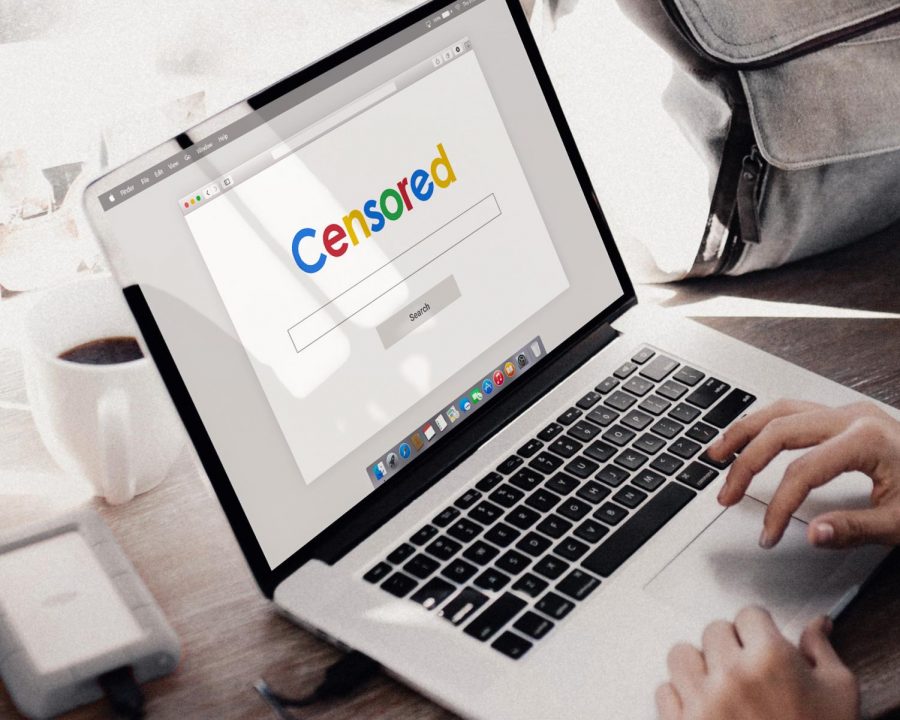OPINION: Tech companies shouldn’t be able to censor public opinions
Removing search results, deleting user posts prohibits free speech, silences conversations
Even though companies like Google and Facebook are private corporations, they serve as free speech forums for millions, making censorship more complicated.
September 20, 2019
The free flow of information is one of the cornerstones of the internet as we know it. Indeed, it’s been one of the cornerstones of the information age, with most programmers and innovators unabashedly supporting uncensored and unobstructed data.
However, with the rise of “Big Tech” and the multibillion-dollar companies commodifying and commercializing the internet, an unhealthy culture of corporate censorship has taken root online. Companies like Google, Facebook and Amazon are often deliberately restricting which information is shared and which is silenced.
“Ethically, tech companies may have a duty that comes simply from their incredible influence on society,” wrote Beth Hindman, WSU communication professor, in an email.
Corporate bias, not free exchange, has become the modus operandi of most tech firms, with an emphasis on suppression of information deemed by companies to be “against their values.”
Numerous examples of this exist online, specifically with regards to Google’s suppression of right-wing media outlets from their search results.
Essentially, this means that these websites are either no longer searchable on Google, or the links to these websites have been isolated to more obscure search terms, making them almost unsearchable, according to a US News article.
Some specific instances of this can be seen in Google’s removal of right-wing videos from its subsidiary, YouTube, and most damningly, large-scale erasure of over 11 million websites from their search engine, with Google employees justifying the action by saying the sites appeared “spammy,” according to US News.
These aren’t isolated to Google, either. Facebook, Amazon, Twitter and hundreds of other large-scale tech companies are performing censorship on a worldwide level, based on little more than corporate politics.
But if you’re good at what you love, never do it for free. That’s why Google is working hand-in-hand with the People’s Republic of China to build a modified version of its search engine that censors government-blocked sites.
Feeling like learning about the Tiananmen Square massacre, scrolling through Facebook or reading in a New York Times article? With Google’s new PRC-approved search engine, government censorship will extend to virtually every facet of Chinese life. One thing’s for sure: it’s great business.
“The press should be the watchdog, keeping an eye on the government, so they can report to the public whatever government meddling is happening,” WSU communication professor Somava Pande said. “At this point, Google’s become more of a lapdog to the Chinese government.”
This begs the question: do tech companies have a moral duty to be unbiased? After all, they are private enterprises, with the right to choose what kinds of projects they choose to offer, and in what ways those projects function.
“I’m not sure they have an ethical duty to be unbiased, but they might have an ethical duty to be transparent,” Hindman said.
Constitutionally, we can’t force tech companies to be completely neutral in their results. However, we can agree that censorship and search biases fundamentally alter the way we receive and process information as a society.
We, as producers and consumers of information, have a responsibility to demand an internet where information can be exchanged openly.
It’s also important to acknowledge that not all information exchanged will be good or even rational. Some of it may even be hateful, vile or offensive. However, we need to be allowed to determine that for ourselves, not through some multibillion-dollar omnipotent algorithm.
What’s the ideal world, then?
“No censorship at all,” Pande said. “But is it possible?”
Regardless of feasibility, drastic action must be taken by those advocating for free access to information.
When information and data can be disseminated and allowed to flow through a society, it benefits all by exposing corruption, informing researchers and educating the population.
When the public perception of an event is shaped by finely crafted corporate propaganda, not only does discourse and debate suffer, but society suffers.
Censorship by technology companies is just as bad as censorship by governments, and neither should be tolerated.

















